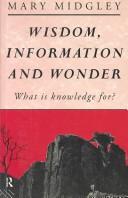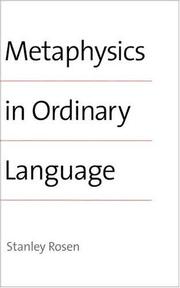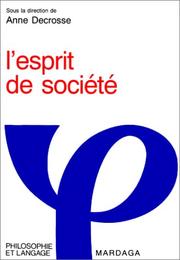| Listing 1 - 10 of 40 | << page >> |
Sort by
|
Book
ISBN: 1554419034 Year: 2006 Publisher: Chicoutimi : J.-M. Tremblay,
Abstract | Keywords | Export | Availability | Bookmark
 Loading...
Loading...Choose an application
- Reference Manager
- EndNote
- RefWorks (Direct export to RefWorks)
This paper attempts to locate current theories about the " principle of charity " within a tradition of thought dealing with the anthropological problem : what is the right way to gain an understanding of other languages, other cultures, other languages ? Traditionally, the answer has been provided by a philosophical doctrine of common sense (all human beings share the same forms of exercising their rational powers). Quine's radical translator and Davidson's radical interprator belong to such a tradition, which does not seem to take into account the facts of human diversity. However, a common sense philosophy inspired by Vico and Wittgenstein should be able to make room both for " charity " (by means of a general common sense shared by all human beings) and for the diversity of forms of life (expressed in local particular common senses within each culture).

ISBN: 0415028299 Year: 1989 Publisher: London Routledge and Kegan Paul
Abstract | Keywords | Export | Availability | Bookmark
 Loading...
Loading...Choose an application
- Reference Manager
- EndNote
- RefWorks (Direct export to RefWorks)
Book
ISBN: 2130636454 Year: 2003 Publisher: Paris : Presses Universitaires de France,
Abstract | Keywords | Export | Availability | Bookmark
 Loading...
Loading...Choose an application
- Reference Manager
- EndNote
- RefWorks (Direct export to RefWorks)
On a longtemps considéré Wittgenstein comme un anti-mentaliste qui niait l'existence ou l'intérêt des processus ou états mentaux. En réalité il lutte contre des mythes par exemple celui de l'intériorité et non pas contre le sujet intériorité. La seule façon d'échapper à l'emprise des mythes est de trouver une manière non mystifiante de parler de la vie mentale, donc d'étudier la grammaire de nos concepts psychologiques pour nous défaire des images incrustées dans notre langage.
Book
Year: 1963 Publisher: Urbana : University of Illinois Press,
Abstract | Keywords | Export | Availability | Bookmark
 Loading...
Loading...Choose an application
- Reference Manager
- EndNote
- RefWorks (Direct export to RefWorks)
Ordinary-language philosophy --- Semantics --- Philosophie du langage ordinaire --- Sémantique
Book
ISBN: 0674064771 0674068483 9780674068483 9780674064775 9780674055223 0674055225 Year: 2012 Publisher: Cambridge Harvard university press
Abstract | Keywords | Export | Availability | Bookmark
 Loading...
Loading...Choose an application
- Reference Manager
- EndNote
- RefWorks (Direct export to RefWorks)
A new form of philosophizing known as ordinary language philosophy took root in England after the Second World War, promising a fresh start and a way out of long-standing dead-end philosophical debates. Pioneered by Wittgenstein, Austin, and others, OLP is now widely rumored, within mainstream analytic philosophy, to have been seriously discredited, and consequently its perspective is ignored. Avner Baz begs to differ. In When Words Are Called For, he shows how the prevailing arguments against OLP collapse under close scrutiny. All of them, he claims, presuppose one version or another of the very conception of word-meaning that OLP calls into question and takes to be responsible for many traditional philosophical difficulties. Worse, analytic philosophy itself has suffered as a result of its failure to take OLP's perspective seriously. Baz blames a neglect of OLP's insights for seemingly irresolvable disputes over the methodological relevance of "intuitions" in philosophy and for misunderstandings between contextualists and anti-contextualists (or "invariantists") in epistemology. Baz goes on to explore the deep affinities between Kant's work and OLP and suggests ways that OLP could be applied to other philosophically troublesome concepts. When Words Are Called For defends OLP not as a doctrine but as a form of practice that might provide a viable alternative to work currently carried out within mainstream analytic philosophy. Accordingly, Baz does not merely argue for OLP but, all the more convincingly, practices it in this eye-opening book.

ISBN: 0300150466 0585380465 9780585380469 9780300150469 0300074786 9780300074789 Year: 1999 Publisher: New Haven, Conn. Yale University Press
Abstract | Keywords | Export | Availability | Bookmark
 Loading...
Loading...Choose an application
- Reference Manager
- EndNote
- RefWorks (Direct export to RefWorks)
In this rich collection of philosophical writings, Stanley Rosen addresses a wide range of topics-from eros, poetry, and freedom to problems like negation and the epistemological status of sense perception. Though diverse in subject, Rosen's essays share two unifying principles: there can be no legitimate separation of textual hermeneutics from philosophical analysis, and philosophical investigation must be oriented in terms of everyday language and experience, although it cannot simply remain within these confines. Ordinary experience provides a minimal criterion for the assessment of extraordinary discourses, Rosen argues, and without such a criterion we would have no basis for evaluating conflicting discourses: philosophy would give way to poetry.Philosophical problems are not so deeply embedded in a specific historical context that they cannot be restated in terms as valid for us today as they were for those who formulated them, the author maintains. Rosen shows that the history of philosophy-a story of conflicting interpretations of human life and the structure of intelligibility-is a story that comes to life only when it is rethought in terms of the philosophical problems of our own personal and historical situation.
Philosophy. --- Ordinary-language philosophy. --- Ordinary-language philosophy --- Philosophy --- Philosophy & Religion --- Ordinary-language analysis --- Ordinary-language method --- Philosophy, Ordinary-language --- Analysis (Philosophy) --- Language and languages --- Mental philosophy --- Humanities --- Metaphysics
Book
ISBN: 3540093869 3642673090 3642673074 9783540093862 Year: 1979 Volume: 4 Publisher: Berlin Springer
Abstract | Keywords | Export | Availability | Bookmark
 Loading...
Loading...Choose an application
- Reference Manager
- EndNote
- RefWorks (Direct export to RefWorks)
Psycholinguistics --- Language. --- Languages --- Dialect --- Dialects --- Language and logic --- Inference --- Reasoning --- Ordinary-language philosophy --- Language

ISBN: 2870094841 Year: 1993 Volume: *83 Publisher: Liége Mardaga
Abstract | Keywords | Export | Availability | Bookmark
 Loading...
Loading...Choose an application
- Reference Manager
- EndNote
- RefWorks (Direct export to RefWorks)
Sociolinguistics --- Filosofie --- Linguistique --- Philosophie --- Sociologie --- Taalkunde --- Ordinary-language philosophy --- Linguistics --- Philosophie du langage ordinaire
Book
ISBN: 2763737544 9782763737546 Year: 2018 Publisher: Qubec : Presses de l'Université Laval,
Abstract | Keywords | Export | Availability | Bookmark
 Loading...
Loading...Choose an application
- Reference Manager
- EndNote
- RefWorks (Direct export to RefWorks)
Il suffit de tirer le fil d’un seul mot et ce sont bien d’autres mots qui reviennent à nous, mots du passé, de nos désirs, de la politique, de la littérature, etc. Ce livre propose de faire cette expérience déconcertante à partir du mot « spécial ». Expérience de lecture qui entretient aussi le besoin de philosophie comme expérience singulière sans fin du langage dans le monde et du monde dans le langage.
French language --- French language --- Language and languages --- Ordinary-language philosophy. --- Etymology. --- Semantics. --- Philosophy
Book
ISBN: 9782212566246 2212566247 Year: 2017 Publisher: Paris Eyrolles
Abstract | Keywords | Export | Availability | Bookmark
 Loading...
Loading...Choose an application
- Reference Manager
- EndNote
- RefWorks (Direct export to RefWorks)
Partez à la découverte des mystères du langage ! Après avoir traité l'humour, les erreurs de raisonnement, la créativité et les mathématiques, Luc de Brabandere se livre à une enquête passionnante et amusante au cœur du langage et des mots. Sans jargon ni références théoriques encombrantes, ce livre captivant vous permettra de comprendre : • Pourquoi le langage a justifié la création d'une discipline à part entière : la linguistique. • Comment définir un signe, une phrase, un langage… • Quelle est la relation que nous entretenons avec les mots. Nous croyons jouer avec eux, mais c'est le contraire : ce sont eux qui se jouent de nous !
Philosophie du langage ordinaire --- Language and languages --- Linguistics --- Ordinary-language philosophy
| Listing 1 - 10 of 40 | << page >> |
Sort by
|

 Search
Search Feedback
Feedback About UniCat
About UniCat  Help
Help News
News